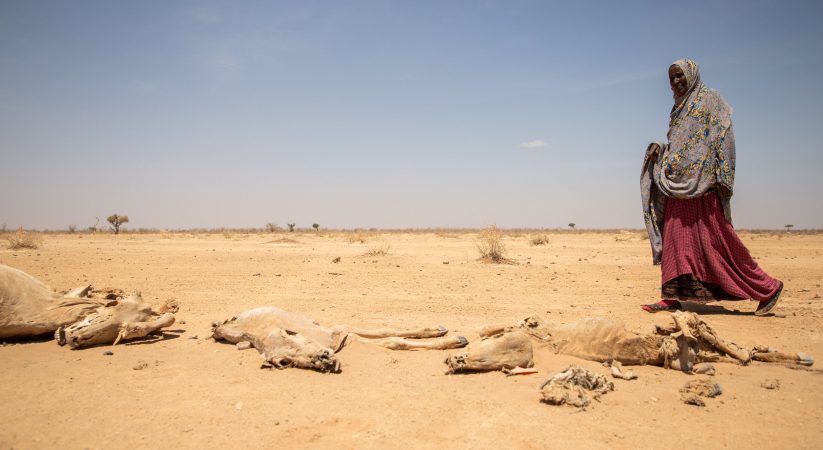
Funds aim to provide time-critical emergency aid and livelihood support to build back self-reliance and protect the most vulnerable against shocks
Rome – The Food and Agriculture Organization of the United Nations (FAO) welcomed a €25 million contribution from the Government of Germany to provide access to food and other basic goods and services while protecting and restoring productive livelihoods in drought-affected communities in Ethiopia, Kenya, Somalia and the Sudan.
An extended, multiseason drought is driving high levels of acute food insecurity across Eastern Africa, with more than 22 million people in southern Ethiopia, Kenya and Somalia in need of urgent humanitarian food assistance (IPC Phase 3 or above) as of March 2023, as crops fail, animals die, and populations are displaced across the region. This figure includes 2.6 million people in Emergency (IPC Phase 4) in Kenya and Somalia and more than 96 000 people in Catastrophe (IPC Phase 5) in Somalia.
In the Sudan, a combination of conflict and insecurity, dry spells leading to crop production failure in the 2021/2022 agricultural season, soaring food and agricultural input prices, and climate extremes are contributing to the deterioration of the food security situation in the country. Up to 11.7 million people are estimated to be facing crisis levels of food insecurity (IPC Phase 3 or worse), of which 3.1 million are in Emergency (IPC Phase 4).
The outlook for this year remains bleak, with increasing concerns about rainfall performance for the March to May 2023 rainy season across the Horn of Africa. However, regardless of seasonal performance during this upcoming rainy season, recovery from a drought of this magnitude will take years and humanitarian assistance needs are expected to remain extremely high throughout 2023. The region is facing its third severe La Niña-induced drought episode in a decade and is on the verge of a catastrophe, if humanitarian assistance is not urgently scaled up and sustained. Drought combined with high food prices, poor access to water, sanitation and health services is exacerbating the situation in a region already beset with high levels of existing food insecurity.
The new funding represents a significant contribution to mitigating the impacts of drought on food security and livelihoods by increasing immediate food access in rural communities, safeguarding and restoring livelihoods and rapidly enabling self-reliance. The intervention seeks to reach almost 1 million of the most vulnerable people in inaccessible and hard-to-reach rural areas, cutting across all impacted livelihoods.
“We are grateful to the Government of Germany for this generous contribution to FAO’s drought response in Eastern Africa at such a critical time,” said Rein Paulsen, FAO’s Director, Office of Emergencies and Resilience. “The current situation demonstrates the urgent need to provide at-scale and sustained humanitarian aid to pull people from the brink of famine and massively scale up investments and policies for disaster risk reduction and resilience building, highlighting agriculture’s crucial role in achieving a sustainable future for the people of the region.”
Scaling up emergency aid and rural livelihood support
Under the project, FAO will provide food insecure rural households with unconditional cash transfers through its cash+ programmes, allowing families to cover basic expenditures in food, health, education, among other. The plus component of the cash package is aimed at safeguarding livelihoods and enabling self-reliance in food production and nutrition by distributing agriculture assistance packages for farmers composed of seeds, tools, subsidized services and fertilizers, as well as distributing animal feed and water transport support for pastoralists.
Of these funds, Ethiopia will receive €7 million, Kenya – €6.5 million, Somalia – €7.5 million and the Sudan – €4 million.
Reaching rural populations with urgent and sustained assistance as fast as possible is essential to save lives, preserve livelihoods and ultimately prevent massive displacement. Livelihoods are rural people’s greatest defense against hunger and malnutrition, and emergency livelihood interventions are cost-effective and impactful. It costs three to seven times less to save a livelihood than to restore it, once it has been lost. It is ten times cheaper to save a goat with veterinary treatment (40 cents) than to buy one ($40). For every $1 spent to protect rural livelihoods, it saves around $10 in food-related assistance.
FAO is helping farmers across Eastern Africa not just to respond to the effects of climate change, but to proactively adapt to the impacts of the climate crisis, and particularly to frequent droughts, by adopting climate-smart farming practices.
__________________________________________________
Sources: FAO Worldwide offices
_____________________________________________________________________________________Xafiiska Wararka Qaranimo Online | Mogadishu, Somalia
_____________________________________________________________________________________Advertisement
_____________________________________________________________________________________







